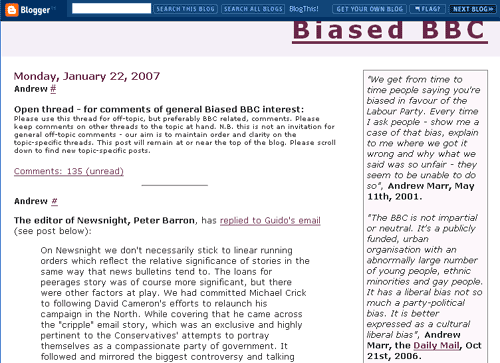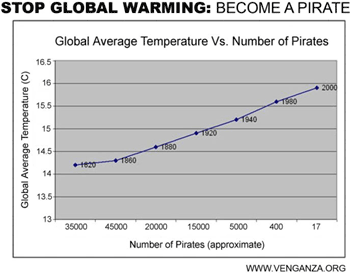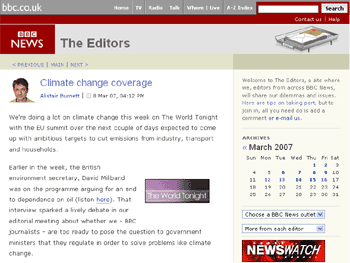My 'biased' view of the Biased BBC blog - part four - Global Warming
![]() Download a print version of this article
Download a print version of this article
Over the last couple of days I've been writing about the Biased BBC site, no doubt, as I pointed out, through my own ex-BBC tinted spectacles. I looked at some of the reasons why I visit the site, some of the success it has had in influencing BBC output, and in a couple of posts I looked at why I dismiss some of the common charges levelled against the BBC in the comments threads there.

Today, though, I want to look at the first of two of the areas that most often crop up on the site - where I don't think the BBC is doing a great job of defending itself against the charges of bias. Put simply, if you are going to charge everyone a compulsory TV Licence to finance an impartial broadcastor, then in a twist of the old adage, it must not just be impartial, it must be seen to be seen to be impartial.
The first area I want to look at where I don't think the BBC is being seen to be impartial is over the issue of climate change and global warming.
The Biased BBC blog was delighted when the BBC's resident institutional loose cannon Jeremy Paxman came out and said:
People who know a lot more than I do may be right when they claim that [global warming] is the consequence of our own behaviour. I assume that this is why the BBC's coverage of the issue abandoned the pretence of impartiality long ago
The more I read on the subject, the more I find myself tending to agree with him.
The majority of the mainstream media in the UK, including the BBC, present man-made climate change as a scientific fait accompli, in much the same way that the flat earth used to be presented as a scientific fait accompli. Now, it might seem self-evident that burning lots of fossil fuels will have an impact on the environment, but it also seems self-evident to a layman like me that through techniques like measuring ice cores and dendrochronology we know that the average climate of the earth has historically varied a great deal, even in comparatively recent times, prior to the man-made industrial revolution.
Like the majority of the people in the UK, I do not understand the scientific research behind the global warming stories. However, I do understand that there is still at least some scientific debate as to whether global warming is man-made, and there is at least some scientific debate as to how great the effects might be, and that correspondingly there ought to be at least some kind of public policy debate about whether the best future course of action is legislation, regulation, technical innovation, or simply to do what mankind has historically done when faced with changes in their local environment - cope with the consequences and adapt.
At the moment, I simply don't feel that from the BBC I'm getting sufficiently balanced output to decide whether or not I should be dismissing global warming as the doom'n'gloom du jour that has replaced the man-made Millenium Bug (could cause worldwide recession acording to the Primie Minister in 1998), vCJD, avian flu, Chernobyl and the London Congestion Charge as things that the media seemed equally convinced were going to bring about the end of British civilisation as we know it.
Climate change is presented in the news as a fact, whether it is the Alps having less snow, or York having flooding - regardless of whether Austria having a mild winter is rare (the warmest in 130 years apparently) or whether York being flooded happens quite a bit because it is badly situated and development in the flood plains hasn't been managed properly. York flooded in 1978 and 1982 without a hint of global warming in the media, yet now it seems you can't report any weather anomoly anywhere in the globe without dragging 'global warming' into the equation.
A recent report on the BBC linked coastal erosion on the east coast of England to rising sea levels caused by global warming - despite the fact that British schoolchildren have been learning for generations about how Britain is gradually tilting due to recovery from the glaciers that formed the landscape, and that coastal erosion is a natural phenomena caused by the action of the sea on the types of rocks exposed.
Alternative theories that propose that climate change either isn't happening in a predictable pattern and so therefore can't be predicted, or might be caused by variations in radiation from the sun rather than man-made processes, or indeed, that it is caused by a lack of pirates, seldom get time on the airwaves.

A recent post on the BBC Editor's blog by Alistair Burnett on the topic suggested that in the future the BBC might consider squeezing even more the limited airtime devoted to people who do not think climate change is necessarily or significantly being influenced by industrialisation:
our commitment to air all sides of a debate can sometimes challenge our commitment to accuracy and impartiality. Put crudely, if the overwhelming majority of climatologists believe that climate change is happening and is largely driven by human activity, do we distort the picture of the scientific debate by airing the views of the small number of dissenting scientists too often?
This is not to suggest we stop interviewing people who deny climate change is happening or that it is happening but is a natural phenomenon, but it is to ask whether we interview them too often and our audience can be given a distorted impression of the balance of opinion in the scientific community.

That isn't a particularly strong argument in my view. I can't think of another area of public policy where the BBC is scrupulous about balancing out coverage based on the percentage of experts who hold a particular viewpoint. For example, in another Editor's blog just the day before, the Newsround editor explained why he is not so concerned with exactly representing the ethnic mix of young Briton on screen, nor is the coverage of the different political parties split strictly according to their level of support either at the ballot box or in recent polls.
Whilst it is true that only on rare occasions does being the lone voice against the tide of scientific mean you are right, it is also true that the Witchfinder General found witches because, well, you see, the job description is in the title. Thus it was always unlikely that the IPCC was going to vote like turkeys for their own funding Christmas by announcing that there was no such thing as the climate change that it is part of their name and mission to quantify.
The BBC's commitment to impartiality includes at its core the idea that coverage ought to be balanced out over time, in different programmes and across different networks, and not be simply a clock-watching exercise within every programme, webpage or news bulletin.
However, on global warming, the BBC can only point to a fig-leaf of programming which has looked at the situation from the point of view that even just maybe it isn't man-made CO2 emissions that are fuelling what might in fact be a cyclical change in the planet's climate. And two of those were documentaries tucked away on BBC Radio Four.
If the worst-case scenario predictions about climate change are true, then the world does indeed face a massive global challenge.
However, if those predictions of what the future will be like in 50 years time are as accurate as the predictions by scientists and politicians about what 2007 would be like from back in 1957, then the three major political parties and the maistream media in the UK could be sleep-walking into a hugely expensive and uneccesary economic outlay to fight a future that doesn't exist.
And at the moment the weight of the BBC's output only seems to be interested in sparking a public debate on the nuances of which drastic measures are required, not whether they are required at all.
In the next part of this series of posts about the Biased BBC blog site, I'm going to be looking at their claims of anti-Israeli bias in BBC News coverage, and looking at some examples from the web where they have raised interesting questions about the quality of the BBC's impartiality.
The BBC's Newswatch programme discussed the Norfolk coastal erosion story this week. View it here
Another thing the mainstream media has done is to ignore the separate question of (a) whether we know if what we are doing (fossil fuels, etc) is causing it or even (b) if any model that is in use is accurate enough for us to tell if (a) is true. The question of whether it is warming could be a done deal. But the ONLY question that impacts public policy is whether or not we can affect it. And that is where there is SIGNIFICANTLY more controversy, and those people are being silenced by being ignored.
At the company I work for (a newspaper company in the US), they have a policy of trying to make their work force look, ethnically, like the public they serve. The argument is that we can't very well represent the black viewpoint in the paper if we have no black people on staff, same with hispanics, gays, etc. However, what they do not do is extend this logic to the question of political affiliation/leaning. If what they are saying about racial/orientation/etc diversity is true, how does it stop being true at the magic line of political leaning?
Well, what happens when everyone on staff is more or less on the left? The viewpoint of the left seems like the only logical one. It's the only one they ever hear espoused with any passion or articulation, the only viewpoint that isn't laughed at in the newsroom, etc. After a while, it seems like it's not an opinion, it's just what intelligent people all over have concluded. And that's basically the modern MSM in a nutshell.
The overwhelming evidence indicates that the climate is changing and that it is very likely that it is the result of human actions. See www.realclimate.org and www.scienceblogs.com/deltoid , passim. The point about past variations in climate is that they have never happened at such a fast rate as now. Normally climate change would take thousands of years - we're seeing changes over half a century.
That's not to say that the BBC is entirely in the right: I was rather alarmed by the thought of the BBC doing a "climate action event" along the lines of Live Earth. The BBC should be presenting the scientific consensus (where there is one), with a purely factual spin. I was highly queasy about the overtly political nature of the Make Poverty History/Live8 stuff. A worthy cause but when it's presented in that way it's counter-productive (The Vicar of Dibley special - shudder. Made me want to go out and steal from Ethiopians. Preachy sanctimonious drivel.)
The point is that the BBC should be presenting the science as is - not overstating it or preaching on it, nor presenting a "balancing perspective" all the time where none exists, nor producing yet another live walk-and-talk from a smug eco-household in Milton Keynes on BBC Breakfast.
PS. There was no scientific consensus on a flat Earth in the Middle Ages - that's a 19th C myth. Aristotle (4th C BCE) believed the Earth to be round, reasoning that as the constellations were different when one went south, this must be due to the curvature of the Earth. Eratosthenes made a pretty accurate measurement of the circumference of the Earth in the 3rd C BCE. See this wikipedia article for a good (and well referenced) summary of beliefs about the shape of the Earth.
Hi,
You've stated:
> However, I do understand that there is
> still at least some scientific debate as
> to whether global warming is man-made
Unfortunately that is not true. Studies of the AGW debate show that pretty much all the scientific literature is pro-AGW, as correctly pointed out in "An Inconvenient Truth".
I would be happy to direct you to the meta-analysis, however, David Suzuki has written an excellent piece on the subject.
There is a real story here that an unbiased BBC could report on -- in fact it deserves a full documentary treatment. And that's the management of public perception through the actions of think-tanks.
This is not a new phenomenon, but is an increasingly common phenomenon, that cuts to the heart of journalism, and how public discourse operates.